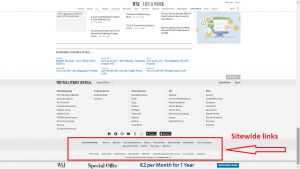Since the introduction of the Penguin algorithm, google has classified links based on their usefulness or spam into different categories. Hence, the backlinks in the link farm, buying backlinks, exchanged backlinks, the backlink in the Private Blog Network, and now the sitewide backlink- were placed in the category of black hat links. In the article “An Ultimate Guide to SEO (Search Engine Optimization)” we introduce Sitewide links. This article from the smart strategy blog describes the sitewide links, how to avoid sitewide links penalty and how to use them effectively.
What is a Sitewide link?
A sitewide link is a link repeated on all or most of the site’s pages, For example, footer links or sidebars of blogs. The developer doesn’t place These links for users, but their primary purpose is to get backlinks to other sites. Google has also recognized this issue and therefore looks at it as spam.
Here is an example of sitewide links in wall street journal:
How will sitewide backlinks affect SEO?
Google launched the Penguin algorithm to improve the status of backlinks. But as you know, every time Google closes the way to black hat SEOs, they create new methods, and Google updates the algorithm again, and this cycle continues.
The Penguin algorithm was also updated after some time so that searched topic is more consistent with search intent and can satisfy its users. In the Penguin update, various types of backlinks were penalized, and sites that used them crashed on the results pages. Unfortunately, Google has placed sitewide links in the category of black hat and malicious links.
From the above, we can conclude that sitewide backlinks are not bad. You will not be penalized if you naturally place a backlink related to your site’s topic in a place repeated on all pages. In other words, the use of sitewide links must be done under the rules and conditions so that it is acceptable to Google and not subject to fines.
Otherwise, you will have to wait for a Google penalty by placing different links on all the site pages without a thematic connection.
The best and most natural way to get sitewide links
There are many ways to get natural sitewide links, which you will see below:
Backlink to the site designer company in the footer
One of the most repeated links in the footer of websites is the link to the website designer. These sites should get backlinks in the text of the site’s content. Also, the website they have designed should be related to their field of work. Of course, note that you use your brand name as anchor text in these cases.
Backlinks to valuable and relevant sites in the list next to blogs
These backlinks are beneficial for users and should not be considered spam. Furthermore, the probability that a backlink to a valid domain related to the site’s topic will hurt the site’s rank is also very low. So you can even buy sidebar links or blogroll links, provided that the site that links to you is valid and has a similar topic. With these conditions, Google will not suspect you.
In this case, it is better to use the brand name so that Google and users understand that this list is for introducing reputable brands in the field of work similar to this site. Of course, exchanging links with these sites is another matter and is considered spam. The fact that you exchange links with another site makes Google sensitive and will deal with this action.
How to avoid the Sitewide links penalty?
From the previous part, you must have realized that the following two essential points can prevent you from being fined for using a sitewide link:
- First, use the brand name as anchor text.
- Place backlinks on websites with a similar theme.
If you follow these two factors, you can easily place your backlinks in parts of the site that are considered sitewide and repeated on all site pages. The nature of some links is such that it is better to repeat them on different pages, such as the following links:
- “Copyright is reserved”
- “Privacy Policy”
- Other websites that are all yours (provided they are thematically relevant)
These links are entirely natural from Google’s point of view and are not subject to sitewide penalties.
Why did sitewide links lose their popularity?
Today, sitewide linking is considered an outdated method; Because after updating Penguin, the trouble of this method is not worth it. Especially since there was a possibility of a penalty at any moment; however, the specific methods mentioned above are entirely standard and will not result in any penalty. But it seems that they do not bring many benefits to the SEO of the site.
Conclusion
In general, if you always follow Google’s policies and everything you do is aimed at keeping users happy, you will never have to worry about ranking down or being penalized. In the case of sitewide links, the issue is the same. Wherever content providers use sitewide links to satisfy users, Google has no problem with it. You can ask through the Smart Strategy SEO service page if you have any questions.
Visit our LinkedIn profile to have more digital marketing infographics and summarized articles.




